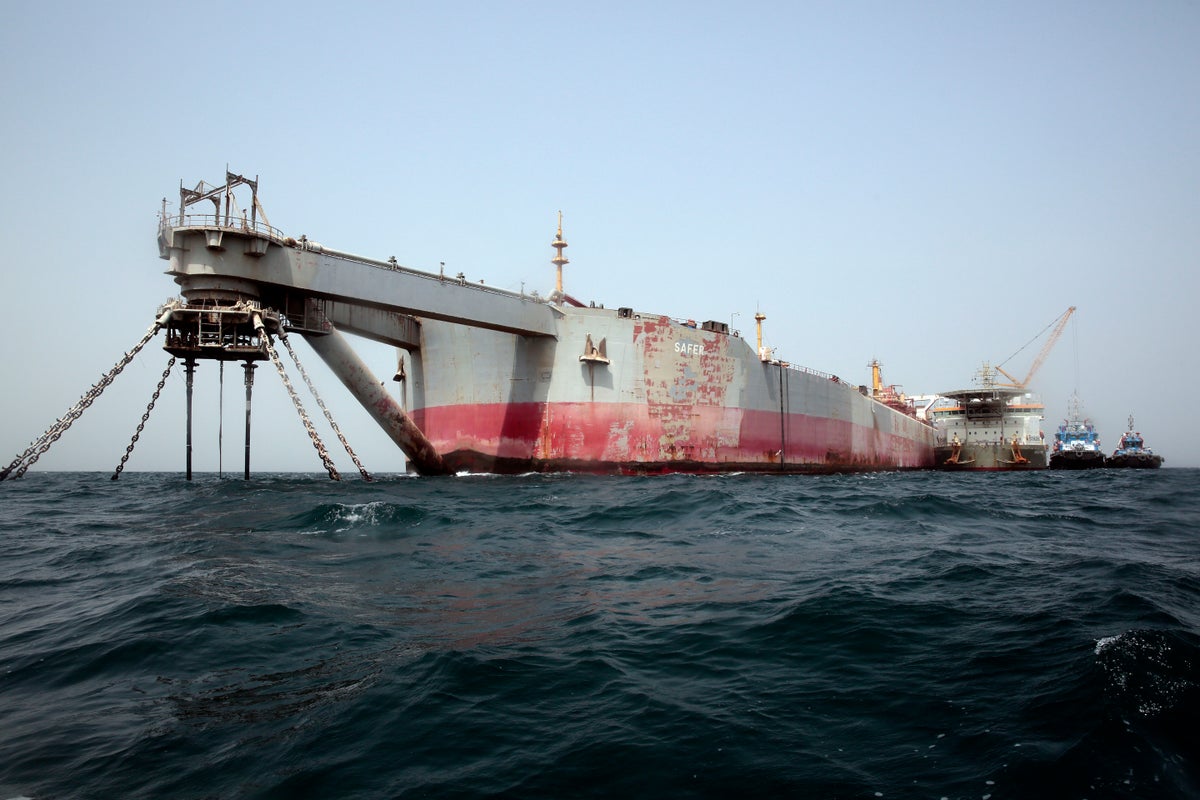
An international team is set to begin siphoning oil out of the hull of a decrepit tanker moored off the coast of Yemen this week, a U.N. official said Sunday. It will mark the first concrete step in an operation years in the making aimed at preventing a massive oil spill in the Red Sea.
More than 1.1 million barrels of oil stored in the tanker, known as SOF Safer, will be transferred to another vessel the United Nations purchased as a replacement to the rusting storage tanker, said Achim Steiner, administrator of the U.N. development program.
“We have reached a critical stage in this salvage operation,” Steiner told The Associated Press hours after the salvage team on Saturday managed to moor the replacement vessel alongside the Safer tanker in the Red Sea. “This marks, in a sense, the completion of the month-long preparatory phase.”
The rusting tanker is a Japanese-made vessel built in the 1970s and sold to the Yemeni government in the 1980s to store up to 3 million barrels of export oil pumped from fields in Marib, a province in eastern Yemen. The ship is 360 meters (1,181 feet) long with 34 storage tanks.
The tanker is moored 6 kilometers (3.7 miles) from Yemen’s western Red Sea ports of Hodeida and Ras Issa, a strategic area controlled by the Iranian-backed Houthi rebels who are at war with the internationally recognized government.
The war in Yemen began in 2014 when the Houthi seized the capital, Sanaa, and much of the country’s north, forcing the government to flee to the south, then to Saudi Arabia. The following year, a Saudi-led coalition entered the war to fight the Houthis and try to restore the internationally recognized government to power.
The vessel has not been maintained for eight years, and its structural integrity is compromised, making it at risk of breaking up or exploding. Seawater had entered the engine compartment of the tanker, causing damage to the pipes and increasing the risk of sinking, according to internal documents obtained by the AP in June 2020.
For years, the U.N. and other governments as well as environmental groups have warned that a major oil spill — or explosion — could disrupt global commercial shipping through the vital Bab el-Mandeb and Suez Canal routes, causing untold damage to the global economy. The tanker carries four times as much as the oil that spilled in the 1989 Exxon Valdez disaster off Alaska, one of the world’s worst ecological catastrophes, according to the U.N.
The U.N. has for years campaigned to raise funds for the salvage operation which cost $143 million, including purchasing a new storage vessel to replace the rusting tanker, Steiner of the UNDP said.
“It is an extraordinarily complex operation in which, first of all, diplomacy was critical, then the logistical ability to mount such an operation and finally to actually be able to be on site with multiple vessels and put in place the conditions, but also the mitigation measures, the contingency plans, the security plans,” Steiner said.
The funding was a major challenge for the U.N. which resorted to crowd funding to help bridge the gap. But the operation still needs around $20 million to be completed, Steiner said. He criticized the oil and gas industry for not stepping up their contributions.
“One can sometimes wonder, you know, is it really up to a school class of children in Maryland to contribute to our crowd funding,” he said.
The replacement vessel, now named the Yemen, reached Yemen’s coast earlier this month and the salvage team managed to safely berth it alongside the Safer to start the ship-to-ship transfer of oil amid unprecedented measures, including a small flotilla of technical and supply vessels, to avoid missteps during the operation.
“Many thought it would never happen,” the UNDP administrator told the AP from New York, adding the salvage team has up to five weeks to complete the whole operation.
After transferring the oil, the replacement vessel would be connected to an under-sea pipeline that brings oil from the fields, he said.
“We will, I think, begin to breathe more easily when we see an empty Safer being towed away” to be recycled,” he said.







